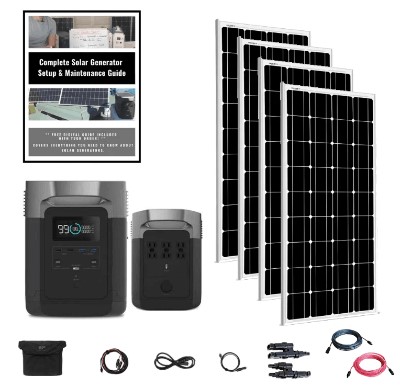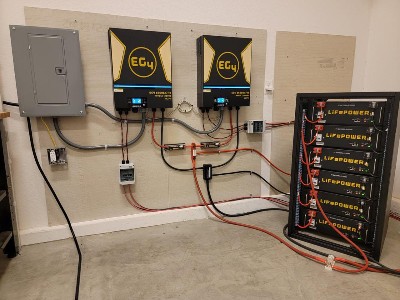
Welcome to our blog post on solar panel systems! In today’s fast-paced world, harnessing renewable energy sources has become more crucial than ever. And when it comes to solar power, there are three main types of panel systems that dominate the market: grid tied, off grid, and hybrid. Whether you’re considering going green or simply curious about how these systems work, join us as we embark on an exciting exploration of each type. Get ready to dive into the world of sustainable energy solutions and discover which solar panel system is right for you!
Introduction to Solar Panel Systems
As more and more people become interested in solar energy, they often wonder what type of solar panel system is right for them. Solar panel systems can be classified as grid tied, off grid, or hybrid. Grid tied solar panel systems are connected to the utility grid. They provide power to your home or business and any excess electricity is sent back to the grid.
Many people choose grid tied solar panel systems because they are less expensive than off grid systems and they do not require batteries. Off grid solar panel systems are not connected to the utility grid. They provide power to your home or business but any excess electricity is lost. Many people choose off grid solar panel systems because they are more independent than grid tied systems.
Off grid systems typically require batteries to store excess electricity for times when the sun is not shining. Hybrid solar panel systems are a combination of grid tied and off grid systems. They provide power to your home or business and any excess electricity can be sent back to the grid or stored in batteries.
Hybrid solar panel systems offer the best of both worlds but can be more expensive than eithergrid tied or offgrid systems.
Grid Tied Solar Panel System: Overview, Benefits and Drawbacks
A grid-tied solar panel system is one of the three main types of solar panel systems, the other two being off-grid and hybrid systems. As the name suggests, a grid-tied system is connected to the public electricity grid.
Grid Tied Solar has several advantages and one big disadvantage.
- The biggest advantage of a grid-tied system is that you can sell excess electricity back to the utility company at a rate known as net metering, or “rolling back the meter.” In most cases, this means you’ll get a credit on your next electricity bill for the power you generated but didn’t use.
- Another big advantage is that you’re not completely cut off from power if your solar panels are not generating enough electricity to meet your needs. With an off-grid system, if your panels are not generating enough power, you’re out of luck – but with a grid-tied system, you can simply draw power from the grid when needed. Grid-tied systems tend to be less expensive than off-grid systems since you don’t need to invest in batteries and other equipment to store excess power for later use.
- There are some drawbacks to grid-tied solar panel systems as well. The most significant drawback is that they only work when the public electricity grid is up and running – so if there’s a power outage, your solar panels will be useless.
Off Grid Solar Panel System: Overview, Benefits and Drawbacks
Off grid solar panel systems are not connected to the utility grid. This means that you will need to generate all of the electricity that you need on your own. The main benefit of this type of system is that you are not reliant on the utility grid, which can be unreliable or even unavailable in some areas.
Off grid systems can be more expensive than other types of solar panel systems, but they may be the only option in some cases. Another benefit of off grid systems is that they can provide battery backup power in remote locations where it would otherwise be unavailable.
Hybrid Solar Panel System: Overview, Benefits and Drawbacks
A hybrid solar panel system is a solar panel system that is connected to both the grid and a backup generator. The benefits of a hybrid system are that it can provide power during a grid outage and can also reduce your electric bill by offsetting the energy you use from the grid. The drawbacks of a hybrid system are that it is more expensive than a grid-tied or off-grid system, and it requires more maintenance.
Comparison of the Three Systems
There are three types of solar panel systems: grid tied, off grid, and hybrid. Each has its own advantages and disadvantages. Grid tied solar panel systems are the most common type of system. They are connected to the power grid, and excess electricity is sent back to the grid. These systems are less expensive than off grid or hybrid systems, but they require a reliable power grid. Off grid solar panel systems are not connected to the power grid. They are more expensive than grid tied systems, but they can provide power in areas where the power grid is unreliable or nonexistent. Hybrid solar panel systems are a mix of grid tied and off grid systems. They are more expensive than either type of system alone, but they offer the best of both worlds – the reliability of agrid-tied system with the flexibility of an off-grid system.
Cost Considerations
There are a few things to consider when it comes to the cost of solar panel systems. The upfront cost of the system is one thing to consider, but you also have to think about the ongoing costs of maintenance and repairs. Grid-tied solar panel systems are typically the most expensive option, but they also have the lowest ongoing costs. Off-grid systems are usually less expensive upfront, but you have to factor in the cost of batteries and other components that are necessary for making the system work. Hybrid solar panel systems fall somewhere in between these two options in terms of both upfront and ongoing costs. Of course, there are other factors to consider besides just the monetary costs when deciding which type of solar panel system is right for you. But if you’re trying to save money, it’s important to keep these cost considerations in mind.
Installation Tips and Advice
If you’re considering installing solar panels, you’ll need to decide which type of system is right for you. Grid-tied systems are connected to the power grid and can provide energy for your home or business, while off-grid systems are not connected to the power grid and will require batteries to store energy. Hybrid systems are a combination of the two, and can either be connected to the power grid or include batteries. There are a few things to keep in mind when deciding which type of system to install. First, consider your energy needs. If you live in an area with reliable sun exposure, a grid-tied system may be the best option. However, if you live in an area with less reliable sun exposure, an off-grid system with batteries may be a better choice. Second, consider the upfront cost of the system. Grid-tied systems tend to be less expensive than off-grid systems, but they may require more maintenance over time. Off-grid systems may have a higher upfront cost, but they typically require less maintenance. Third, consider the installation process. Grid-tied systems are generally easier to install than off-grid systems, but both types of systems will require professional installation. Fourth, consider the long-term costs of ownership. Grid-tied systems typically have lower long-term costs than off-grid systems because you’ll be able to take advantage of net metering policies (if available).
Maintenance and Troubleshooting Tips
Assuming you have a grid tied solar system, the first thing you should do if you experience problems is check your inverter. The inverter is what changes the DC electricity your solar panels produce into AC electricity, which is what powers your home. If the inverter is not working, your solar system will not produce any power. If your inverter is working but your system is still not producing power, the next step is to check for shading. Even a small amount of shading can dramatically reduce the output of a solar panel. Check for trees or other objects that may be casting a shadow on your panels and trim them back if necessary. If you have a hybrid system, the troubleshooting process is similar to that of a grid tied system. However, you will also need to check your backup battery to make sure it is charged and working properly. If you are still having trouble after following these tips, please contact a qualified solar technician for further assistance.
Conclusion
As you can see, there are a variety of solar panel systems available to meet your specific energy needs. Grid-tied, off-grid and hybrid systems each provide unique advantages and disadvantages that should be considered before committing to one system over another. With careful research and consideration, you can find the perfect system for your home or business. Taking advantage of the power of the sun is a great way to make sure that your energy needs are met in an efficient and cost-effective manner.





